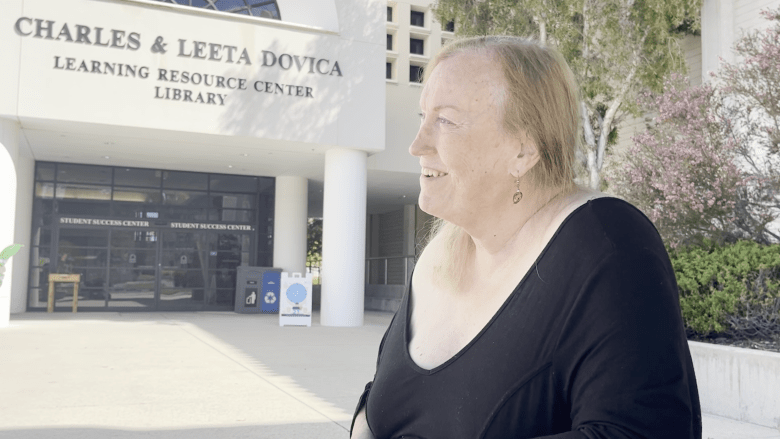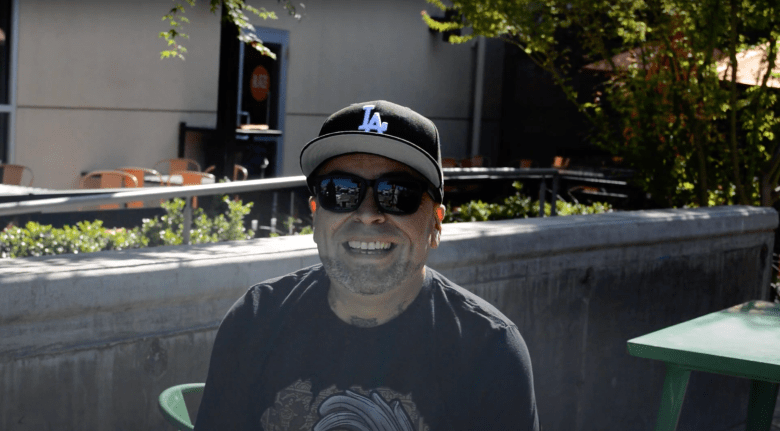It was 1949, and behind the closed doors of a small hospital room in San Luis Obispo, a doctor held up a newborn baby. This child was born with a condition called Klinefelter syndrome, which causes a person to have ambiguous genitalia. She was born with two X chromosomes and an X and a Y chromosome.
Her mother, originally thinking that her child was female, told the nurse that she wanted to name her Peggy. The nurse told her that she couldn’t name a child a nickname.
The doctor then dropped her, and the nurse immediately caught her. This was the story Peggy Jones was told growing up.
At the start of Jones’ life, the discrimination against her for a condition out of her control began. This life experience inspired Jones to take the opportunity to be a “book” through an event called The Human Library, which was located at Cuesta College’s SLO campus in March 2024. At the Human Library “books” get to talk about their life experiences and answer questions with audience members that are called “readers.”
According to the Human Library website, “The[ir] broad selection of [human] books provide readers with ample choice to challenge their stereotypes.”
Cuesta College Human Library
On March 6, 2024, Cuesta College hosted their first Human Library event with help from the Cuesta College Library, the Cuesta College Student Health Center and the SLO County Behavioral Health Department.
“The people who are invited to serve as books are people whose stories are often not heard,” Cuesta College Librarian Laurie Buccholz said. “So people [who spoke are] from underrepresented groups, racially, gender wise, gender orientation and sexual orientation, [who] have faced prejudice or stereotyping.”
According to Cuesta College Reference Librarian Denise Fourie, 150 people attended the event. About 120 of the attendees were students, and the rest of the attendees were faculty and staff.
The students that were there, were there for “the whole [four hours],” Fourie said. “So, [there] was a really good connection.”
The SLO County Behavioral Health Department helped plan this event because of the benefits it could have on the community.
“Our hope is that we encourage them to engage in these conversations outside of just events like this and really bring a level of openness and understanding when they are meeting someone new or talking with someone about a topic that they’re unfamiliar with,” Annie Jankovitz, the College Wellness Coordinator for the SLO County Behavioral Health Department, said.
Cuesta interdisciplinary studies senior Luna Dodds had two friends that were “books,” so she came to the event to support them.
“It was [an] opportunity to hear things that people don’t usually talk about that are normally very personal or people keep guarded,” said Dodds.
Peggy Jones
One book that generated a large audience was Peggy Jones, an intersex individual that was born in SLO in 1949. Since doctors would not allow intersex infants to leave the hospital with ambiguous genitalia, Jones underwent surgery to change her ambiguous genitalia into male genitalia.
“They took a while, three doctors, two days to figure out what they wanted to make me,” said Jones, who is genetically neither male nor female.
Socially, she was expected to participate in sports and activities with boys. Once Jones reached puberty, though, she developed breasts, despite being on hormone blockers and testosterone. From this point, Jones did not know her place in the world. Her body was considered too feminine to be a man yet too masculine to be a woman.
“You try to live and do what society wants you to do,” said Jones. “Standing out gets you nowhere except hurt.”
In 1967, Jones started taking classes at Cuesta but was drafted in 1968 to fight in the Vietnam War. When the army doctor noticed Jones’ breasts, she was sent home.
“People with Kleinfelters were rejected from the draft as far back as World War II,” said Jones.
When Jones came back to SLO, she married a woman and adopted the woman’s three children. Jones and the woman eventually divorced, and she realized that living as a man did not feel right. Jones decided to stop taking testosterone and began presenting as a woman.

Jones now works for a SLO-based nonprofit called Your True Gender, which has given her the opportunity to speak about her experiences as an intersex person at colleges and universities around the globe. Having a job as an intersex advocate prepared Peggy to speak at the Human Library.
Anthony Benavidez
Anthony Benavidez, another book from the Human Library, had a complicated journey leading him to SLO County. Benavidez is originally from Southern Los Angeles, which is where he joined a gang at 13 years old.

“Eighth grade, that’s when I started selling [drugs] for the first time,” Benavidez said, who is now 47.
At 20, Benavidez had his first child and stopped selling drugs. After having two more children, Benavidez got married and moved to SLO. For most of his childrens’ lives, he had primary custody.
Benavidez turned to painting as a therapeutic outlet. He currently sells prints of his work on Facebook.
“Without my kids or my art, I would be dead or imprisoned,” Benavidez said.
Benavidez’s youngest child is now 23, so he is done raising children. Aside from painting, he also works for SLO County Behavioral Health, which is how he got the opportunity to share his story through the Human Library.
“A lot of people are living that life cycle [in gangs], you don’t have to live that life cycle,” Benavidez said. “That is kind of my message. There are ways to get out of it.”
What’s Next for the Cuesta Human Library?
Due to the reaction from the community, the Cuesta College Library applied to host another Human Library, which was later approved by the nonprofit.
“I would love to see [another Human Library],” said Dodds. “I think [they can] even bring back the same people, Cuesta has a lot of people rotate out of here.”
Kristina Van Wert is a library and information technology sophomore that is about to graduate. She is interning at the Cuesta Library to finish up the requirements for her degree. Because of Van Wert’s job, she was involved in the preparation of the event and had the opportunity to attend some of the talks.
Experiencing the Human Library “really opens you up and increases empathy,” Van Wert said.
Since readers and books have the opportunity to engage in conversation, both the audience and the speaker have the ability to inspire each other with their stories.
“I hope they invite me back because I found it very enjoyable listening to other people,” said Jones.
